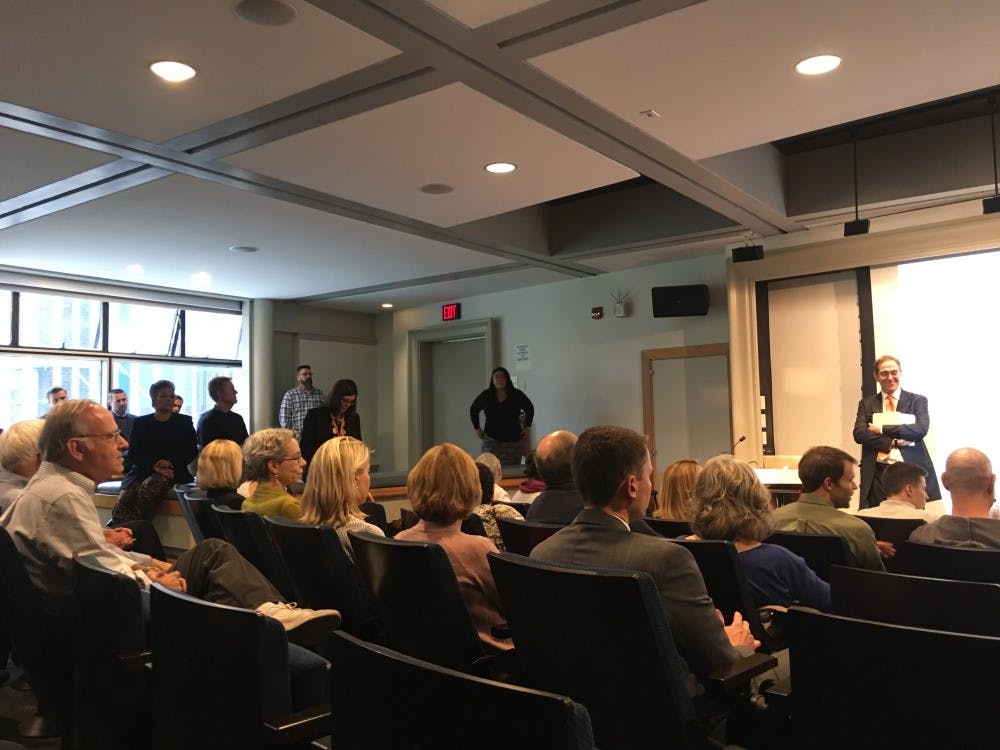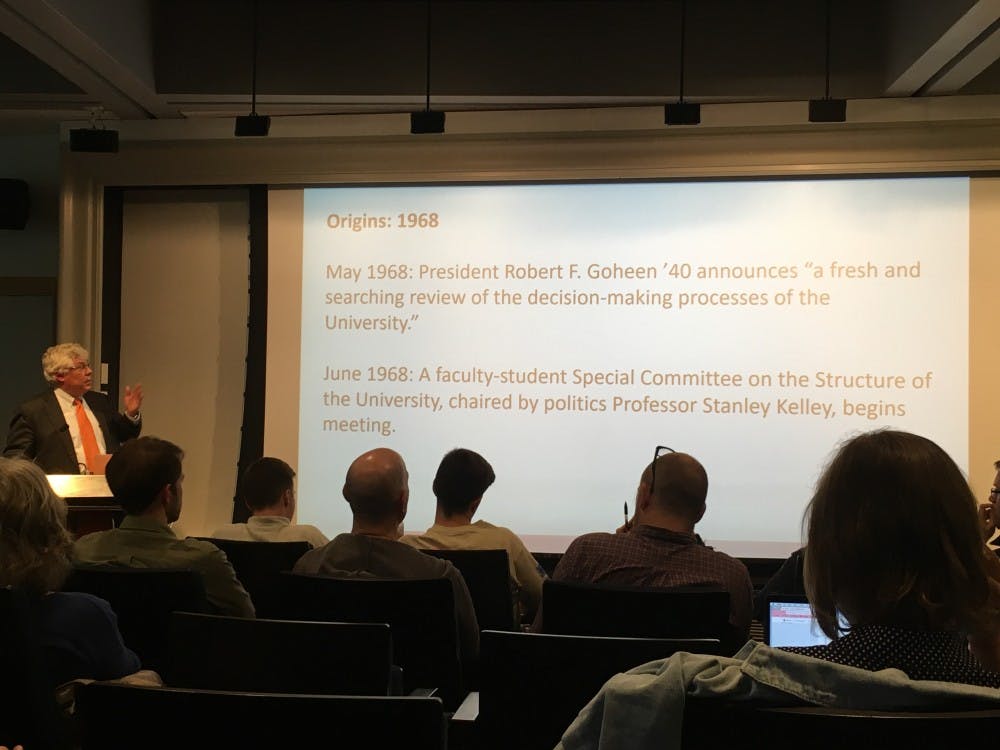During the first Council of the Princeton University Community meeting of the 2018–19 academic year, members discussed trustee Bob Hugin ’76’s controversial U.S. Senate campaign, the revised grading policies, and how to deal with controversial campus speakers. The meeting was held Monday at 4:30 p.m. in Betts Auditorium in the School of Architecture.
According to the CPUC’s homepage, the council is “a permanent conference of the representatives of all major groups of the University” where they can raise and be exposed to problems.
At the beginning of the Monday meeting, President Eisgruber said that the same day, he and Dean of the Faculty Sanjeev Kulkarni sent a memorandum to faculty members that clarified the minimum penalty for all cases in which faculty members are found responsible for sexual harassment.
During the question-and-answer period, which was the second item on the agenda, several University graduate students expressed concern over trustee Bob Hugin’s past anti-women and anti-gay views, in light of his recent Republican campaign for U.S. Senate.
In 1992, Hugin fought to prevent women from joining one of the University’s eating clubs, Tiger Inn. And in 1976, Hugin told the newspaper Home News that if a member of Tiger [Inn] were found to be gay, “he wouldn’t last long.”
Eisgruber had prefaced the question-and-answer period with his positive statements about Hugin. Many concerns about Hugin had been submitted in advance of the meeting.
“Hugin is a terrific trustee for this University,” Eisgruber said. “He is somebody who is an extraordinary source of judgment and counsel on the board and an important ally on a number of different issues, including issues with respect to diversity.”
Eisgruber expressed that these statements are not a political endorsement for Hugin.

He also said that he disagrees with comments that Hugin made over 25 years ago. Eisgruber pointed out that Hugin has said that he regrets the comments he made and that he recognizes that he was in the wrong.
“I can assure you that he is a trustee of good standing, and we are very fortunate as a university to have him as a trustee here,” Eisgruber concluded.
Several undergraduate and graduate students of the Wilson School questioned whether the University’s values regarding diversity and inclusion would be compromised if “men like Bob Hugin were propped up into positions of power.”
Students emphasized that the University is supposed to a safe space where women and members of the LGBTQ+ community can feel welcome and comfortable.

Others asked about how the trustees have handled the Hugin controversy and whether there are processes that determine when a trustee member is in poor standing.
Eisgruber responded that these questions are inappropriate for him to answer.
One man, who said that he was in an openly gay relationship, came to Hugin’s defense and said that he has never sensed homophobia from Hugin in the dozens of years that he has known him.
Eisgruber declined to answer more follow-up questions on Hugin from the same person.

Later, Dean of the College Jill Dolan spoke about grading trends. In October 2014, a University mandated target for 35 percent A grades was removed from grading policy .
Now, grading policy encourages departments to develop their own assessment measures and grading standards.
Dolan noted that the grade point average for academic year 2017–18 is .107 higher than it was in AY 2003–04 and .071 higher than it was in AY 2014–15. Furthermore, since 2014, the most significant shift has been an increase in A grades and a proportional decrease in B+ grades. Dolan added that GPA has increased across all departments since AY 2004–05 and AY 2014–15.
However, the AY 2017–18 report noted that the increase in A grades has caused “compression at the top of the class,” making it difficult to “differentiate among the highest performing students when awarding departmental honors and prizes.”
Increased requests for grade changes accompanied the GPA increases, Dolan said.
Responding to a request from a graduate student, Dolan said that she will work to make the grading trends known to the graduate student body, since many graduate students act as preceptors and graders for courses.
Vice President for Campus Life W. Rochelle Calhoun concluded the meeting by discussing campus speakers.
She explained that the purpose of inviting speakers to campus should be to increase free expression on campus.
Calhoun offered six solutions in the face of speakers who invoke protests or controversy: conduct “due diligence;” reach out to the Office of the Dean of Undergraduate Students; offer an opening statement; “stay the course;" “lead;“ and “lean on” campus resources.
“The goal of [campus speakers] is to broaden perspective and to engage in dialogue,” Calhoun said, while explaining her first solution, due diligence. “Make sure that the speaker is actually able to deliver on that goal,” she said.
Calhoun added that students and organizations should not rescind invitations once speakers have been invited to speak.
“If you’re going to be bold enough to invite a speaker that is going to cause dialogue, be bold enough to lead,” she said.
According to University vice president and secretary Robert Durkee ’69, CPUC consists of 51 members: six officers of the University, the President and the Provost, 15 faculty members, 12 undergraduates, seven graduate students, four alumni, and seven general members.
The President also presides at meetings of the Council, which meets six times a year.
The next CPUC meeting will be held on Nov. 12.








